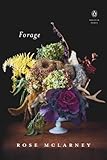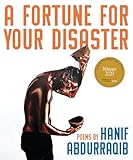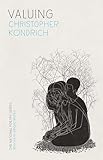Here are eight notable books of poetry publishing in September.
Forage by Rose McLarney
McLarney has been a gifted storyteller since her first book, The Always Broken Plates of Mountains, but I dare say that she’s getting even better, more hypnotic. She’s one of our finest poets of the wild: her notes of appreciation are grounded in a love of careful cataloging of the world through language. There are the paired, almost petite lines of “Pet” about a cat: “How long I watched, how I loved // to watch, and how I tried / to make him a little home. // But what is wanted wants / to leg it elsewhere, no matter.” Gentle lines, but the poem ends with a start: “He would slaughter // his way back to solitude.” McLarney is masterful at those turns—an awareness of how quickly life can jolt. That range is also present in “And Still I Want to Bring Life into This World.” The narrator is driving home from a doctor’s appointment, listening to a radio broadcast—the words reverberating within that small space. The broadcaster speaks of “failed fields, washed over.” A dying world. The narrator can’t help but turn the pain inward: “I can think only of the news // that I may have no children, when there are more / than the world can manage to keep alive. // Must the answer be only the variety / of grief? If not to envy all the irrigated orchards bore, // to sorrow for the trees, sprayed and sterile?” McLarney’s environmental threnodies move from the quick truth—“Wildflowers tend to themselves // while all people plant these days are satellite dishes”—to a sense that has been accumulating across all of her books: how do we hold on to despair, and dust, and memory? A gorgeous book.
Ringer by Rebecca Lehmann
“Elegy for Almost,” a poem that sits halfway through Lehmann’s collection, took my breath away. “It was as simple as this: I really wanted you / and then you were gone.” Those first lines—finely-timed and direct—speak across the page and toward the soul. Throughout her poems, Lehmann is well-paced, creative, and constructive, and the result in this poem is a powerful song of grief. “I was unconscious when the doctor slipped / her instruments in and took you out: / sac with no heartbeat, placenta that wouldn’t / let go its hold, raspberry sized cluster / of cells that didn’t put together right. / My love.” And then from that stanza to 17-year-old memories: driving, “stoned, around the Wisconsin countryside,” drifting over the yellow line. Wondering: “Why do I think of those far away days now, / and again and again?” Ringer teems with excellent poems, including the title piece, which offers many truths in a single page. “Each morning trumpeted into being with a chorus of baby squawks,” the refrains of her life. It is a poem about motherhood, about occupying space in this weary world. Snow clings to curbs, even as daffodils push through mud. Life, all around her, tries its best. The narrator brings the stroller around the block, again and again, the cycle bringing her back to her son’s birth, when “two medical students / held my legs and joked about going to the gym. The epidural coursed / strong medicine into my spine. The anesthesiologist flitted in / and out of the room like a large hummingbird.” Lehmann, generously and gracefully, swings us through entire lives.
Father’s Day by Matthew Zapruder
“When I was fifteen / I suddenly knew / I would never / understand geometry”; where Zapruder begins his poems, and where he ends them, are often quite different places—and that is one of the joys of Father’s Day, a heartfelt, melancholy collection. Often his columnar style naturally guides our eyes: he’s a poet of syntactic movement, often spare with punctuation, instead letting the lines themselves do the lifting. In “When I Was Fifteen,” he remembers “those inscrutable / formulas everyone / was busily into / their notebooks scribbling.” The narrator had his own talents. He writes the story of the field hockey star for the school paper, and then gives his history notes to her. She “took them / from my hands / like the blameless / queen of elegant / violence she was.” Zapruder has a great way of mapping our interiors, as when the narrator, wrapped-up in his down jacket, walks home and “listened to / the analog ghost / in the machine / pour from the cassette / I had drawn / flowers on.” Other poems are wry jabs, as with “Generation X”: “I was born the autumn / after a wave of flowers / swept the land // too late to appear in even / one poem by Frank O’Hara,” and “The Poetry Reading”: “At the poetry reading I am listening / to the endless introduction. / The young poet waits / for a cloud of applause / through which he will go / to his doom.” You’ve got to laugh at po-biz to stay alive. Also: stay for Zapruder’s beautiful afterword.
Daybook 1918: Early Fragments by J.V. Foix (edited and translated by Lawrence Venuti)
Foix is the pen name of Josep Vicenç Foix i Mas (1893-1987), a Catalan poet once lauded by Harold Bloom but largely neglected by English language readers and critics. Venuti does a necessary service in translating and curating these unusual and intriguing pieces. Daybook 1918 includes prose poems and fragments which Venuti notes “endows recognizably Catalan customs and geography with a surrealist quality” through a particular process: “Foix developed a method that favored not automatic writing, freed from rational control, but rather a combination of dream and hypnagogia.” Venuti is a sage and lyric guide through Foix’s strangeness. In one untitled piece, the narrator begins: “She assured me that two hundred young men lived in the village, each the owner of a black horse like mine.” No such thing is true, the man learns, as the “stables lie empty, as do the houses. Only my horse and I wander the village, night and day, through the labyrinth of its shadows.” Another piece, “Without Symbolism,” offers some: “The conductor of the municipal band is so corpulent that he takes up half the square. When he extends an arm, all the village children stretch out their hands to turn somersaults as if they were on the horizontal bar.” Foix’s poems are probably best read between midnight and dawn—or any similar time when we are most attuned to our shadow selves. Added bonus: a few excellent essays on poetry, consciousness, and art by Foix.
An American Sunrise by Joy Harjo
If you’ve somehow never experienced the work of our new poet laureate, Harjo’s new book is a great introduction. From “Seven Generations”: “Beneath a sky thrown open / To the need of stars / To know themselves against the dark.” That reflexive turn—themselves—which could be so heavy and stodgy in the hands of a lesser poet, becomes illuminating here. Sunrise, sunset, morning, night, pilgrimage—much of Harjo’s book is about movement northward and drifting south. An introductory note recalling the 1830 Indian Removal Act offers a roadmap to her central theme: the desire of indigenous peoples to return home. In certain ways, this happens through story: “I leave you to your ceremony of grieving / Which is also of celebration / Given when an honored humble one / Leaves behind a trail of happiness / In the dark of human tribulation.” She writes: “Once there were songs for everything, / Songs for planting, for growing, for harvesting, / For eating, getting drunk, falling asleep, / For sunrise, birth, mind-break, and war.” An American Sunrise affirms Harjo’s identity as a poet of testimony. “Let’s honor the maker,” she ends one poem. “Let’s honor what’s made.”
I Will Destroy You by Nick Flynn
“Haecceity,” writes Flynn, is a word “almost impossible / to pronounce,” but means “thisness, as in here / & now”—which makes it quite useful. Flynn’s poetry does this: a little turn or refraction to refocus our gaze, moving from words (their sounds and shapes) to bodies (our sounds and shapes). “In / the end I held your arms briefly / over your head & // warned that I was in no way / safe,” the narrator says. He is “often not filled with any great love // for—of—God,” but “then, briefly & wholly, your / thisness, like // beeswax, it / filled me.” Wholly and holy, Flynn’s poems feel encompassing. Yet there’s a tender fear of that action, as in “Life is Sweet”: “I worry sometimes // how everything can be / contained // turned into a poem.” That’s a refreshing worry. Flynn, who has powerfully mined his own life within his poetry and prose, carries a particular caution in his lines. In “Saltmarsh,” he writes of finding “a book, splayed / open, spine broken, // facedown in the flattened // grass.” Turned-over, the “words // slide off the page as if each / were a bug // that dies in sunlight. It’s how / I want this // poem to be—unreadable— / not at the beginning // but by the end.” The words dissolving; the poem becoming us and everything around us.
A Fortune for Your Disaster by Hanif Abdurraqib
“& I tell my boys there is a reason songs from the 90s are having a revival & it’s because the heart & tongue are the muscles with the most irresistible histories.” Abdurraqib’s lines lunge; his titles blur into the text. There’s real energy in this book, and there’s also a compelling sense of love, longing, and loss. His poems hold hope, but a measured one: “If one must pray, I imagine // it is most worthwhile to pray towards endings. / The only difference between sunsets and funerals // is whether or not a town mistakes the howls / of a crying woman for madness.” In a series of poems titled “How Can Black People Write About Flowers at a Time Like This”—a question that is, tellingly, also a statement—Abdurraqib delivers some of his most pointed lines: “maybe all the blues / requires is a door / through which a person / can enter and exit.” He ends one poem: “a father stands / over his crying son & hisses / I’ll give you something to cry about / as if he didn’t already / bring a child into a world / that requires neither of them.” A deft collection.
Valuing by Christopher Kondrich
Valuing opens with an apt epigraph from Simone Weil: “Everything without exception which is of value in me comes from somewhere other than myself, not as a gift but as a loan which must be ceaselessly renewed.” Her words mark this collection. “It is alright,” Kondrich writes. “You may dwell in me.” Elsewhere: “In order to be immortal you have to be invisible to the part of you that knows you have to die.” Kondrich’s poems have the curious gift of being gently abstract—not vague, but broad, perhaps even kenotic. From Caedmon: “I sit with my head in my hands, turned / against everything. I’m facing what I think // is the wind. It has the eyes I’ve sought, / the skin I’ve felt under stone.” This outward sense makes many of Kondrich’s poems feel like hymns released into the sky. Valuing is a refreshingly sincere and skilled book about the ineffable: “Friend, if you are there, / come to meet me. I am drifting devoured. / I am ready to say goodnight. / Come meet me so I can release it.”

















